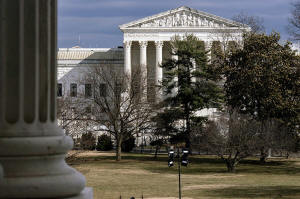Supreme Court seems likely to rule for Ohio woman claiming job bias
because she's straight
 [February 27, 2025]
By MARK SHERMAN [February 27, 2025]
By MARK SHERMAN
WASHINGTON (AP) — The Supreme Court seemed likely Wednesday to side with
an Ohio woman who claims she suffered sex discrimination from her
employer because she is straight.
The outcome of the case could remove an additional requirement that some
courts apply when members of a majority group, including those who are
white and heterosexual, sue for discrimination under federal law.
Justice Brett Kavanaugh stated a way of resolving the case, that seemed
to enjoy broad support among his colleagues.
“Discrimination on the basis of sexual orientation, whether you are gay
or straight, is prohibited. The rules are the same whichever way it
goes,” Kavanaugh said.
The justices heard arguments in an appeal from Marlean Ames, who has
worked for the Ohio Department of Youth Services for more than 20 years.
Ames contends she was passed over for a promotion and then demoted
because she is heterosexual. Both the job she sought and the one she had
held were given to LGBTQ people.
Title VII of the Civil Rights Act of 1964 bars sex discrimination in the
workplace. A trial court and the 6th U.S. Circuit Court of Appeals ruled
against Ames.

The question for the justices is that the Cincinnati-based 6th Circuit
and several other appeals courts covering 20 states and the District of
Columbia apply a higher standard when members of a majority group make
discrimination claims. People alleging workplace bias have to show
“background circumstances,” including that LGBTQ people made the
decisions affecting Ames or statistical evidence showing a pattern of
discrimination against members of the majority group.
The appeals court noted that Ames didn’t provide any such circumstances.
[to top of second column]
|

The Supreme Court is seen in the distance, framed through columns of
the U.S. Senate at the Capitol in Washington, Feb. 20, 2025. (AP
Photo/J. Scott Applewhite, File)

Ohio Solicitor General T. Elliot Gaiser told the justices that the
officials who made the job decisions did not even know Ames' sexual
orientation.
But even Geiser didn't object too much to the narrow outcome that
seemed most likely. “Everyone here agrees that everyone should be
treated equally,” Gaiser said.
His concession prompted Justice Neil Gorsuch to note, “We're in
radical agreement on that today.”
America First Legal and other conservative groups filed briefs
arguing that members of majority groups are as likely to face job
discrimination, if not more so, because of diversity, equity and
inclusion policies.
President Donald Trump has ordered an end to DEI policies in the
federal government and has sought to end government support for DEI
programs elsewhere. Some of the new administration's anti-DEI
initiatives have been temporarily blocked in federal court.
Lawyers for America First, founded by Trump aide Stephen Miller,
wrote that the idea that discrimination against members of majority
groups is rare "is highly suspect in this age of hiring based on
‘diversity, equity, and inclusion.’”
But there was no mention of DEI by the justices on Wednesday.
All contents © copyright 2025 Associated Press. All rights reserved
 |